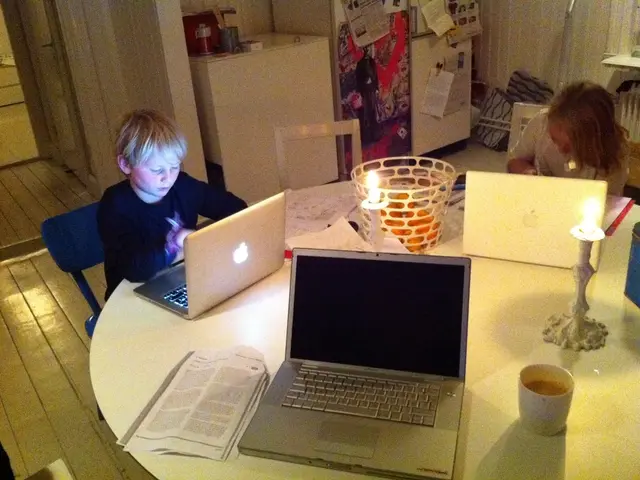Understanding Children's Emotions: A Comprehensive Guide to Assisting Children in Recognizing Their Feelings
Understanding and Managing Children's Emotions: A Comprehensive Guide for Parents and Caregivers
Emotional growth is vital for children's overall development, impacting their social lives, school performance, and happiness. To ensure their success, it is essential to help them recognize and manage their feelings from infancy through their teenage years. This guide provides a comprehensive understanding of emotional development and the strategies to support children in building strong emotional intelligence.
- Key Takeaways
- Emotionally intelligent children tend to succeed academically and form stronger relationships.
- Secure bonds with parents or caregivers are essential for emotional regulation in toddlers.
- Positive interactions should outweigh negative reprimands to promote emotional growth.
- Collaboration among caregivers is crucial for children struggling with emotional regulation.
- Seek professional guidance when a child's emotional issues interfere with their well-being.
Emotional Development in Children
Emotional development is a complex but important aspect of a child's growth, beginning from birth. Children feel and express various emotions, such as anger, sadness, joy, and fear, as they mature and learn to handle more complex emotions.
During the early years, brain development plays a significant role in emotional smarts. Rapid growth in the amyggdala and limbic system, particularly during the first 18 months, enables children to understand and react to emotions.
Emotional Intelligence Matters
Emotional intelligence is crucial for children's development, leading to essential skills like self-awareness and emotion management. These skills contribute to success in school and positive relationships.
Children progress through three emotional stages: noticing, expressing, and managing emotions. Supporting them at each stage facilitates their emotional growth.
Primary vs Secondary Emotions
From birth, children exhibit basic emotions like anger, joy, and fear. As they grow older, they develop secondary emotions, which are more complex and learned through experiences.
Understanding emotional development helps parents and caregivers support children effectively and set them up for future success.
Early Signs of Emotional Expression in Infants
Infants begin showing emotions from their earliest days. By 2-3 months, they smile socially, showing joy and friendliness. Laughter emerges spontaneously around 4 months, signifying feelings like anger and sadness. As they grow, their emotional skills develop rapidly.
Infants learn to calm down, which aids better sleep. Even when they are not hungry or tired, they may fuss, indicating discomfort. Responding to these cues helps them feel cared for and secure.
Parents' Role in Helping Children Identify Emotions and Build Emotional Understanding
Parents play a significant role in shaping their children's emotional growth. Supportive parenting and focusing on a child's feelings can lead to positive outcomes, while strict or punishing approaches may harm their social and mental health.
- Creating a Safe Emotional Environment
By creating a safe space for children to express their feelings, parents can encourage emotional growth. Active listening, validating their feelings, and providing emotional support are key.
- Modeling Appropriate Emotional Responses
Children learn from what they see, so exhibiting positive emotions helps them manage their feelings effectively. This fosters good coping strategies and emotional intelligence.
- Building Trust and Connection
Consistent and comforting relationships strengthen bonds with children and contribute to their emotional health. Research shows that children with strong social-emotional skills behave better in school.
Parents greatly influence their children's emotional understanding, as shown by research emphasizing the role of parents in teaching social-emotional skills for success in school and life.
Age-Appropriate Emotional Development Milestones
Monitoring children's emotional journey from infancy to adolescence provides valuable insights into their growth. By 2 months, children can calm down when spoken to, look at faces, and smile when approached. They also show happiness when seeing familiar people.
As they reach 4 months, they begin using smiles to get attention and laugh when tickled. At 6 months, most children recognize people they know, enjoy looking in mirrors, and laugh. They start to display various emotions like happiness and sadness.
The Role of Emotions in School Success
Strong emotional understanding impacts social skills, which are essential for academic success. Research indicates a strong link between emotional intelligence and social skills in teenagers. Children who manage their emotions and understand others' feelings perform better in school and maintain healthier friendships.
Strategies for Managing Strong Emotions
Teaching children to cope with intense emotions is crucial for their emotional growth. Parents can provide the necessary tools to navigate such feelings in a healthy way.
- Situation Selection
Encourage children to avoid situations that cause them distress and seek out positive ones instead.
- Situation Modification
In the event that avoidance is not possible, helping children change the setting or find calming activities can reduce emotional intensity.
- Deep Breathing Exercises
As children get older, they can learn deep breathing exercises to help manage strong emotions.
- Mood Journal
Keeping a journal to track emotional patterns helps children better understand and manage their emotions.
- Mindfulness
Practicing mindfulness, such as noticing feelings and surroundings, helps children recognize when to express their emotions.
- Stress-Busting Activities
Regular exercise, meditation, and other stress-relieving activities support emotional regulation and help children manage their feelings. If feelings become too overwhelming, seeking professional help is advisable.
Challenges in Emotional Development
Children encounter various challenges as they grow emotionally. These may include difficulty expressing feelings, risky behavior in teenage years, and difficulty with facial cues or body language. Developmental issues, such as ADHD, autism, and anxiety, can also impact emotional development. Stress from early life events like trauma can make it difficult for children to calm down and regulate their emotions.
Supporting Children During Emotional Transitions
Life changes can cause anxiety in children, such as starting a new school or experiencing family changes. To help them cope, establish regular routines, provide choices, and show emotional support. Offer coping tools like visual timers, celebrate their achievements, and guide them through stress-busting activities like meditation and exercise.
Environmental Impact on Emotional Growth
Children's emotional development is influenced by their environment. Research shows that positive emotional environments help children develop essential skills for success in life. Books, educational materials, digital tools, and apps can help parents support their children's emotional growth.
When to Seek Professional Help
If a child's emotional struggles become severe and affect their daily life, seek help from a doctor, school counselor, or mental health professional. Mental Health America provides online tests for various emotional issues to help determine the need for professional intervention.
Conclusion
A child's emotional growth is a lifelong journey, and supporting them properly engenders resilience, empathy, and a strong connection to themselves and others. Tailoring emotional learning approaches to each child's individual needs is crucial for their intellectual and emotional development. Emotional intelligence is vital for a child's overall well-being, success in school, and positive social relationships.
- Emotional intelligence and strong emotional regulation can lead to academic success and the formation of healthy friendships.
- Parental bonding plays a significant role in emotional regulation in toddlers, and positive interactions are vital for emotional growth.
- Collaboration among caregivers is essential for children struggling with emotional regulation, and seeking professional guidance when a child's emotional issues interfere with their well-being is advisable.
- Understanding emotional development aids in supporting children effectively, helping them manage emotions, and setting them up for future success.
- Parents can create a safe space for children to express their feelings, model appropriate emotional responses, and build trust and connection to facilitate emotional development.
- Strategies for managing strong emotions include engaging in stress-busting activities, practicing mindfulness, keeping a mood journal, using deep breathing exercises, situation modification, and situation selection.








